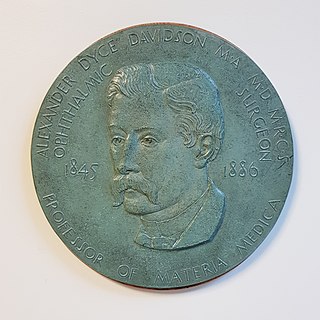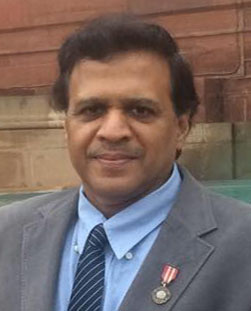Related Research Articles

Sir Joseph Fayrer, 1st Baronet KCSI FRS FRSE FRCS FRCP LLD was a British physician who served as Surgeon General in India. He is noted for his writings on medicine, work on public health and his studies particularly on the treatment of snakebite, in India. He was also involved in official investigation on cholera, in which he did not accept the idea, proposed by Robert Koch, of germs as the cause of cholera.
Ramamurthi Balasubramaniam was an Indian neurosurgeon, author, editor, a pioneer in neurosurgery in India and often recognized as the Father of Neurosurgery of India. He set up the Department of Neurosurgery at the Government General Hospital, Chennai in 1950, the Department of Neurosurgery at the Madras Medical College and founded the Institute of Neurology, Madras in the 1970s. He was awarded the Padma Bhushan and the Dhanvantri Award for his contribution to the field of Neurosurgery in India. He is also a recipient of the Lifetime Achievement Award of Madras Neuro Trust.
The King's Birthday Honours 1936 were appointments in many of the Commonwealth realms of King Edward VIII to various orders and honours to reward and highlight good works by citizens of those countries. The appointments were made to celebrate the official birthday of The King. They were published on 19 June 1936.
The 1931 New Year Honours were appointments by King George V to various orders and honours to reward and highlight good works by citizens of the United Kingdom and British Empire. They were announced on 30 December 1930.
The King's Birthday Honours 1933 were appointments by King George V to various orders and honours to reward and highlight good works by members of the British Empire.
The King's Birthday Honours 1931 were appointments by King George V to various orders and honours to reward and highlight good works by members of the British Empire. The appointments were made to celebrate the official birthday of The King. They were published on 2 June 1931.
The King's Birthday Honours 1929 were appointments by King George V to various orders and honours to reward and highlight good works by members of the British Empire. The appointments were made to celebrate the official birthday of The King. They were published on 3 June 1929.

Nottidge Charles MacNamara (1833–1918) was a Surgeon-General in the Indian Medical Service and later a consulting ophthalmic surgeon in London.
The 1942 New Year Honours were appointments by King George VI to various orders and honours to reward and highlight good works by citizens of the United Kingdom and British Empire. They were announced on 30 December 1941.
Ernest William Henderson Cruickshank FRSE LLD was a Scottish physician and physiologist. He was the author of several textbooks on nutrition.

Alexander Dyce Davidson MD FRSE was British academic and surgeon. He was Professor of Materia Medica at Aberdeen University. He was described as a "sweet and amiable character". He specialised in ophthalmic surgery.
The 1922 Birthday Honours were appointments by King George V to various orders and honours to reward and highlight good works by citizens of the British Empire. The appointments were made to celebrate the official birthday of The King, and were published in The London Gazette on 2 June 1922.
Puliyur Krishnaswamy Duraiswami (1912–1974) was an Indian orthopedic surgeon, medical writer and the Director General of Health Services under the Government of India. Besides being a Fellow of the Royal College of Surgeons of England and a founder Fellow of the National Academy of Medical Sciences, he published several articles on orthopedics and was a recipient of Robert Jones Medal and the Presidential Merit Award of the British Orthopaedic Association. The Government of India awarded him the third highest civilian honour of the Padma Bhushan, in 1966, for his contributions to the Medical Science.
Natesan Rangabashyam (1936–2013), popularly known NR, was an Indian surgical gastroenterologist and medical academic, known for his pioneering efforts in the fields of surgical gastroenterology and proctology in India. He was known to have established the department of Surgical Gastroenterology at Madras Medical College and introduced the first MCh course in Surgical Gastroenterology in India. A former honorary surgeon to the President of India, he received B. C. Roy Award, the highest Indian award in the medical category, twice. The Government of India awarded him the third highest civilian honour of the Padma Bhushan, in 2002, for his contributions to medical science.

Atul Kumar is an Indian ophthalmologist who is currently the Chief & Professor of Ophthalmology at Dr. Rajendra Prasad Centre for Ophthalmic Sciences (RPC-AIIMS), the national apex ophthalmic centre at All India Institute of Medical Sciences, Delhi. He was awarded the Padma Shri award in January 2007 for his services to the medical field. He specializes in vitreoretinal surgery and also heads the Vitreo-Retinal, Uvea and ROP services at RPC-AIIMS.

Andrew Wood Wilkinson was a British paediatrician of Scottish extraction and the first Professor of Paediatric Surgery in the UK.
George Mackay (1861-1949) was a British ophthalmic surgeon. He served in the Department of Ophthalmology of the University of Edinburgh and the Royal Infirmary of Edinburgh, and was a member of the Ophthalmological Society of the United Kingdom, the Scottish Ophthalmological Club and the French Ophthalmological Society.

Ernest Frederic Neve (1861-1946) was a British surgeon, Christian medical missionary, and author who provided medical care to the people of Kashmir and pioneered work on Kangri cancer. He established the Kashmir Mission Hospital and the Kashmir State Leper Hospital with his brother Arthur Neve and made significant contributions to the healthcare facilities in Kashmir throughout the over 50 years that he spent there.
Arulanandham Solomon Johnson was the first Indian Psychiatrist. He received his BA from University of Madras in 1917, and completed his MBBS from Madras Medical College in 1922. He went on to pursue MD from University of Edinburgh and was the first doctor from South India to become a member of Membership of the Royal Colleges of Physicians of the United Kingdom and Membership of the Royal Colleges of Physicians of the United Kingdom. He also co-founded the Indian Psychiatric Society in 1947 in Delhi.
Lieutenant-general Sir Ernest William Charles Bradfield was an English first-class cricketer and British Army officer. Graduating from St Mary's Hospital Medical School, he joined the Indian Medical Service in 1903 and would serve in campaigns in the North-West Frontier Province of British India and in the Mesopotamian campaign of the First World War. He would go onto hold a number of senior appointments within the Indian Medical Service, rising to the rank of lieutenant-general. Bradfield was noted as being infleuential in the establishment of the Indian Army Medical Corps during the Second World War. In addition to his lengthy and decorated military career, Bradfield also played first-class cricket on four occasions for the Europeans cricket team in India.
References
- ↑ "Page 171 - University-of-Aberdeen-Roll-of-Service-in-the-Great-War-1914-1919".
- ↑ "Cruickshank, Martin Melvin | Library, Special Collections and Museums | the University of Aberdeen". Archived from the original on 22 December 2015. Retrieved 16 December 2015.
- ↑ The London Gazette: 3 January 1941
- ↑ C D Waterston; A Macmillan Shearer (July 2006). Former Fellows of The Royal Society of Edinburgh, 1783–2002: Part 1 (A–J) (PDF). Royal Society of Edinburgh. ISBN 090219884X. Archived from the original (PDF) on 24 January 2013. Retrieved 18 September 2015.
- ↑ British Medical Journal: January 1942